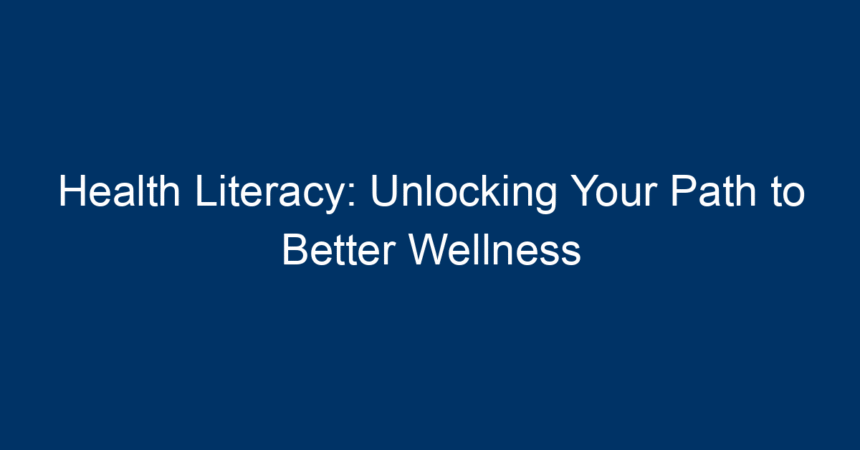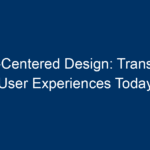In today’s fast-paced world, information overload can make navigating our health a daunting task. From understanding medical terminology to deciphering treatment options, many people find themselves overwhelmed. This is where health literacy comes into play. It’s more than just reading a prescription label; it’s the ability to obtain, process, and understand basic health information needed to make informed decisions about one’s health. Understanding health literacy can directly unlock pathways to better wellness, enabling individuals to engage more actively in their healthcare.
What is Health Literacy?
Health literacy encompasses a range of skills required to navigate the health care system effectively. It involves:
- Reading and Understanding: The ability to understand health-related texts and documents, such as health brochures, consent forms, and medication instructions.
- Communication: Effectively communicating with healthcare providers about symptoms, medications, and treatment options.
- Analytical Skills: The ability to evaluate health information, critically assess the credibility of sources, and apply knowledge to make informed health decisions.
The Importance of Health Literacy
Health literacy is a critical determinant of health outcomes. Individuals with high health literacy levels tend to:
- Manage chronic diseases more effectively.
- Make better lifestyle choices (e.g., diet, exercise).
- Adhere to medication regimens.
- Understand health care instructions, leading to fewer hospitalizations.
Conversely, low health literacy is linked to poor health outcomes, increased healthcare costs, and a higher incidence of hospitalization. This makes understanding health literacy essential for everyone.
How Health Literacy Affects Your Well-Being
1. Empowering Patients
When individuals understand health information, they become empowered to take charge of their health. Empowerment includes:
- Making Informed Choices: With good health literacy, individuals can weigh the pros and cons of treatment options, ask appropriate questions, and seek second opinions when necessary.
- Setting Health Goals: Understanding one’s health status enables goal setting tailored to personal circumstances, leading to better compliance.
2. Enhancing Communication with Healthcare Providers
Effective communication is vital in healthcare. A high level of health literacy allows patients to:
- Ask Questions: Patients who are confident in their understanding can ask clarifying questions during consultations, ensuring they grasp the key points discussed.
- Describe Symptoms Accurately: Clear and concise communication about symptoms can lead to more accurate diagnoses.
- Understand Treatment Plans: When patients understand their treatment, there’s a higher likelihood they will follow instructions, leading to better health outcomes.
3. Improving Chronic Disease Management
Chronic diseases often require ongoing management. Health literacy plays a vital role in:
- Self-Management: Knowledgeable patients can better manage conditions such as diabetes, hypertension, and asthma by adhering to treatment plans effectively.
- Preventing Complications: Understanding warning signs and knowing when to seek help can prevent complications, thereby reducing hospital visits.
Addressing the Gaps in Health Literacy
Despite the importance of health literacy, significant disparities exist, often influenced by:
- Socioeconomic Factors: Individuals from lower socioeconomic backgrounds may have limited access to health information resources and education.
- Cultural Differences: Language barriers and cultural beliefs can hinder the ability to understand health information.
- Educational Background: Those with lower educational attainment may struggle with complex medical terminology.
Strategies to Improve Health Literacy
-
Use Simple Language: Health professionals should use plain language when communicating with patients. Avoiding jargon is key to ensuring understanding.
-
Visual Aids and Tools: Utilizing diagrams, charts, and illustrations can enhance comprehension. Infographics about health concepts can simplify complex information.
-
Teach Back Methods: Asking patients to summarize their understanding of a treatment plan can clarify points and reinforce learning.
-
Accessible Resources: Providing pamphlets and resources in multiple languages can cater to diverse populations, improving overall health literacy.
- Community Programs: Engaging the community through workshops that focus on basic health concepts can increase awareness and understanding.
Personal Strategies to Enhance Your Own Health Literacy
1. Know Your Health Status
Take time to understand your health status. Regular check-ups and being proactive in discussing results with your healthcare provider will keep you informed.
2. Ask Questions
Don’t hesitate to ask questions during appointments. Aim to clarify anything you don’t understand regarding diagnoses, treatments, or medications.
3. Utilize Technology
Leverage health apps and reliable health information websites. Many platforms offer user-friendly interfaces that can demystify health information.
4. Engage in Health Education Programs
Look for local workshops or online courses that focus on health literacy. These programs can offer valuable insights into managing your health.
5. Join Support Groups
Engaging with others who share similar health concerns can provide insight and information. Support groups can also foster a sense of community.
The Role of Healthcare Institutions
Healthcare institutions play a crucial role in promoting health literacy. They can contribute by:
- Training Staff: Ensuring healthcare professionals receive training on how to communicate effectively with patients can bridge the literacy gap.
- Creating a Welcoming Environment: The atmosphere in which care is provided should be patient-centered, encouraging dialogue and questions.
- Providing Resources: Institutions should disseminate easy-to-understand materials that patients can refer to at home.
Conclusion: Taking Charge of Your Health Journey
In conclusion, health literacy is the key to unlocking a better path to wellness. By empowering yourself through knowledge, fostering effective communication with healthcare professionals, and taking advantage of available resources, you can significantly enhance both your health and well-being.
Embrace the journey toward better health literacy. The more informed you are, the better equipped you’ll be to make decisions that foster a healthier life. Remember, your health is not just about treatments; it’s about understanding your body and choices. Take action today and seize control of your health destiny!




